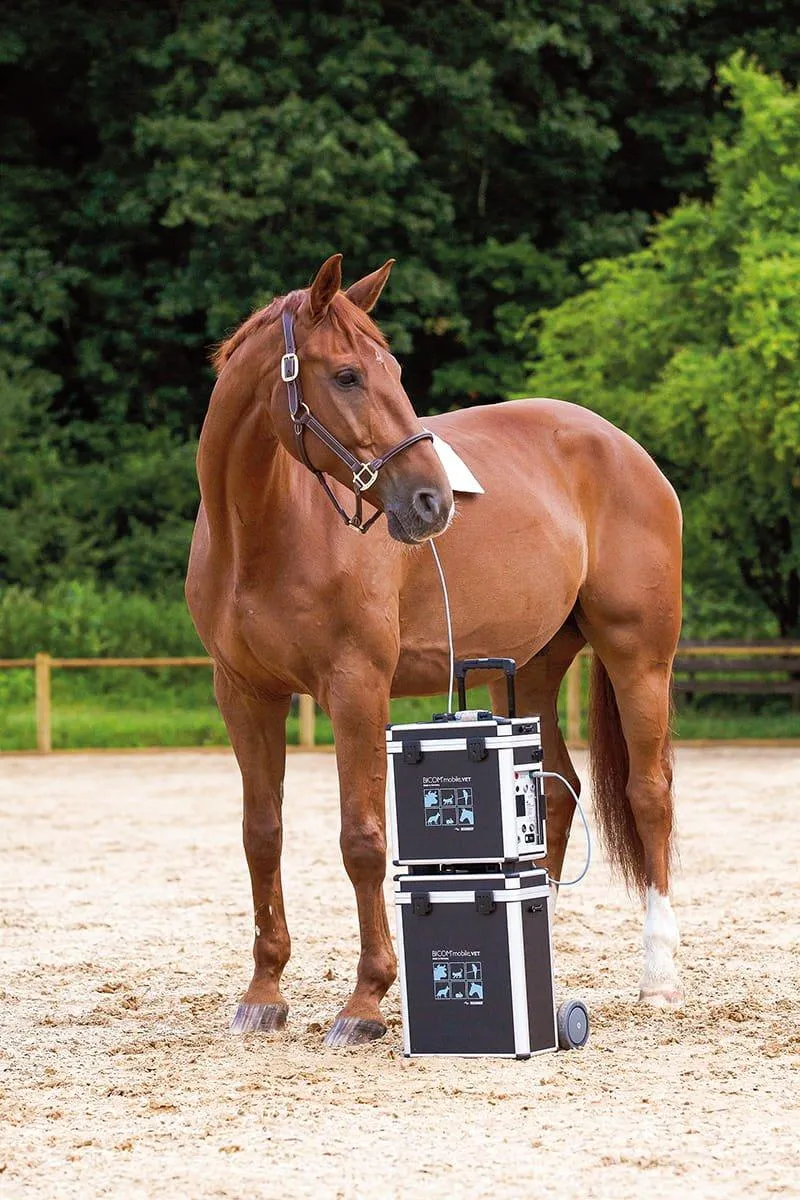Welcome to our veterinary page!
in this section, you can discover what bioresonance therapy is and how it can be a useful tool to enhance your veterinary practice.
Bioresonance therapy is an alternative treatment method that uses electromagnetic frequencies to address imbalances in the body. When applied to animals, it can help to alleviate a range of health conditions by promoting natural healing processes. This non-invasive therapy is gaining popularity among pet owners who are looking for safe and effective ways to support their animal’s well-being. Learn more about bioresonance therapy for animals and how it may benefit your furry friend.
Bioresonance has long been used to identify and target the root cause of a variety of health problems in people. More recently, this technology has also been applied to pets and other animals with much success. BICOM® bioresonance therapy can be used in the treatment of various types of animals, including, Dogs, Cats, Horses, Rodents, Birds and more.
Would you like to know more?
A range of experiences, research and scientific studies into the efficacy of bioresonance treatment can be found on our Blog section. This is where you can view the latest findings and articles about therapy with the BICOM® or browse the article archives.
You can also learn more about the features of the specific devices in the BICOM® range through our therapy machine page. This can help you to see which product will suit you, your clients and your practice best.

Bioresonance Allergy Treatment: Natural Relief That Works
Bioresonance Allergy Treatment: A Natural Way to Relief
Understanding Bioresonance Allergy Treatment
Allergies are more than just an inconvenience—they can significantly affect daily life, causing sneezing, itching, skin reactions, digestive issues, fatigue, and even respiratory difficulties. Whether triggered by pollen, food, pet dander, or chemicals, allergies result from an overactive immune system mistakenly identifying harmless substances as threats.
Traditional treatments like antihistamines, steroids, and immunotherapy can help manage symptoms, but they don’t always address the underlying cause. This is where bioresonance allergy treatment is gaining attention. It offers a non-invasive, drug-free approach that aims to rebalance the body's energy system and retrain it to respond more appropriately to allergens.
But what makes this therapy different from conventional treatments, and does it really work? Let’s explore the science, benefits, and real-world effectiveness of this alternative approach.
How Does Bioresonance Allergy Treatment Work?
Bioresonance therapy operates on the principle that every cell in the body emits electromagnetic frequencies. These frequencies create a unique energy pattern that reflects a person’s overall health. When someone has an allergy, their body’s frequencies become disrupted, leading to an overreaction to certain substances.
A bioresonance device is designed to detect these imbalances and send corrective electromagnetic signals to restore harmony. This process helps the immune system "unlearn" its allergic response, gradually reducing symptoms over time.
The treatment involves:
Allergy Identification – The bioresonance device scans the body to detect energetic disturbances linked to allergens.
Frequency Adjustment – The machine emits counter-frequencies to neutralize allergic reactions.
Immune System Reprogramming – Over multiple sessions, the body adapts to these corrections, learning to tolerate allergens naturally.
Many individuals who undergo bioresonance therapy report a significant reduction in symptoms for allergies related to pollen, dust, pet dander, food, and chemical sensitivities.
Scientific Evidence: What Do Studies Say?
Bioresonance therapy has been used in Europe and other parts of the world for decades, but scientific research is still evolving. However, early studies suggest promising results:
A 2014 study published in the Journal of Alternative and Complementary Medicine found that bioresonance therapy significantly reduced symptoms in patients with allergic rhinitis.
A German study conducted in 2000 reported that 83% of patients with food allergies experienced relief after undergoing bioresonance treatment.
Research published in Medical Science Monitor highlighted bioresonance as a tool that could help modify immune system responses to allergens.
While larger clinical trials are needed, many individuals who have tried bioresonance therapy report noticeable improvements, making it a compelling option for allergy sufferers seeking natural alternatives.
Common Allergies Treated with Bioresonance
Bioresonance therapy is used to treat a wide variety of allergies, including:
1. Food Allergies
Many people suffer from food sensitivities to dairy, gluten, nuts, shellfish, and artificial additives. Bioresonance therapy aims to retrain the immune system to tolerate these substances without triggering an adverse reaction.
2. Respiratory Allergies
Pollen, dust mites, mold, and pet dander can cause symptoms like sneezing, runny nose, itchy eyes, and congestion. Bioresonance therapy may help reduce the body’s hypersensitivity to these airborne allergens.
3. Skin Allergies
Eczema, hives, and contact dermatitis are common allergic reactions. By balancing the body’s energy, bioresonance therapy may help soothe skin irritations and improve overall skin health.
4. Chemical Sensitivities
Exposure to perfumes, cleaning products, pesticides, and pollution can trigger allergic responses. Bioresonance therapy may help the body detoxify and build resistance to these substances over time.
Benefits of Bioresonance Allergy Treatment
Many individuals turn to bioresonance allergy treatment because of its unique advantages over conventional allergy therapies:
Drug-Free & Non-Invasive – No medications, needles, or chemicals involved.
Addresses the Root Cause – Focuses on correcting the body's energy imbalances rather than just masking symptoms.
Potential for Long-Term Relief – Some patients experience lasting improvements after completing their treatment.
Custom-Tailored Approach – Each session is adapted to the individual’s unique bioenergetic profile.
Unlike traditional treatments that often require lifelong medication, bioresonance therapy aims to provide lasting relief by gradually retraining the immune system.
What to Expect During a Bioresonance Session?
A bioresonance therapy session typically follows these steps:
1. Initial Consultation – The practitioner discusses the patient's allergy history and symptoms.
2. Energy Scan – The bioresonance device analyzes the body's electromagnetic frequencies to detect imbalances.
3. Treatment Application – The machine emits corrective frequencies to counteract allergic responses.
4. Monitoring and Adjustments – The therapy is adjusted based on how the body responds over multiple sessions.
Each session lasts between 30 to 60 minutes. While some people notice improvements after a few sessions, others may need continued treatment for optimal results.
Are There Any Side Effects?
Bioresonance therapy is considered safe, with minimal side effects. Some people may experience mild fatigue, headaches, or flu-like symptoms as their body detoxifies. These reactions are temporary and usually subside within 24 to 48 hours.
Unlike medications that may cause drowsiness, dizziness, or dependency, bioresonance therapy supports the body's natural healing process without unwanted chemical side effects.
Who Can Benefit from Bioresonance Therapy?
This therapy is suitable for:
Individuals with long-term allergies that haven’t responded to conventional treatments.
Those seeking a drug-free, holistic approach to allergy management.
People who prefer non-invasive, pain-free treatment options.
Individuals looking to strengthen their immune system and improve overall well-being.
However, bioresonance therapy should not replace medical treatment for severe allergic reactions, such as anaphylaxis. Always consult a healthcare professional before making changes to your allergy management plan.
Why More People Are Choosing Bioresonance for Allergies
As awareness of holistic health solutions grows, more allergy sufferers are turning to bioresonance therapy. Unlike conventional treatments that focus on symptom management, bioresonance aims to reprogram the body's response to allergens. Many individuals prefer this method because it is drug-free, non-invasive, and personalized to their body's needs.
Additionally, bioresonance therapy does not introduce foreign substances into the body, reducing the risk of side effects commonly associated with medications. With the increasing demand for natural and alternative treatments, more wellness clinics are now offering bioresonance as an effective solution for long-term allergy relief.
Can Bioresonance Therapy Help Strengthen the Immune System?
Since allergies stem from an overactive immune system, bioresonance therapy may help regulate immune responses over time. By correcting energetic imbalances, this treatment supports the body's natural healing abilities, potentially leading to fewer allergic reactions and an overall boost in immunity.
Research suggests that restoring energy balance may enhance the body’s ability to recognize and tolerate harmless substances that previously triggered allergic reactions. Many patients report experiencing improved resilience to allergens, fewer flare-ups, and a noticeable reduction in overall inflammation after completing their therapy sessions.
Bioresonance vs. Traditional Allergy Treatments
Traditional allergy treatments, like antihistamines and steroids, provide temporary relief but often come with side effects. Bioresonance therapy, on the other hand, targets the root cause of allergies by rebalancing the body’s energy. While more research is needed, many individuals report lasting improvements, making bioresonance an appealing alternative.
Unlike medications that suppress symptoms, bioresonance seeks to retrain the body’s response to allergens, aiming for long-term relief rather than short-term fixes. Additionally, traditional treatments can be expensive over time, whereas bioresonance offers a cost-effective approach that may reduce the need for ongoing medication use.
Conclusion
If traditional allergy treatments haven’t provided lasting relief, bioresonance allergy treatment may be a promising alternative. Many individuals report experiencing a significant reduction in symptoms, improved immune function, and greater overall wellness.
While more research is needed, the growing popularity of bioresonance therapy suggests that it holds real potential as a complementary approach to allergy management. If you’re looking for a natural, non-invasive way to address allergies at their source, booking a consultation with a qualified bioresonance practitioner may be the first step toward lasting relief.
FAQs
1. What is bioresonance therapy for allergies?
Bioresonance therapy is a non-invasive treatment that uses electromagnetic frequencies to help the body reduce allergic reactions.
2. How does bioresonance detect allergies?
The device scans the body's energy patterns to identify imbalances linked to allergens and then sends corrective frequencies to restore balance.
3. Is bioresonance treatment safe?
Yes, it is a drug-free and painless therapy with minimal side effects, making it a safe alternative for allergy management.
4. How many sessions are needed for results?
Results vary, but many people notice improvements after a few sessions, while others may need ongoing treatments.
5. Can bioresonance therapy treat food allergies?
Yes, it is commonly used to help manage sensitivities to dairy, gluten, nuts, and other food allergens.
6. Does bioresonance work for seasonal allergies?
Many patients report relief from pollen, dust, and pet-related allergies after completing their treatment sessions.
7. Are there any side effects of bioresonance?
Some individuals may experience mild fatigue or headaches as their body detoxifies, but these effects are temporary.
8. Can children undergo bioresonance therapy?
Yes, bioresonance is safe for children and is often used to help manage allergies and sensitivities in younger patients.
9. Does bioresonance provide permanent allergy relief?
While some experience long-term benefits, results depend on individual responses and may require maintenance sessions.
10. Where can I try bioresonance therapy?
Bioresonance therapy is available at holistic health clinics and specialized practitioners offering energy-based treatments.
Quick Links





Facebook
Instagram
Mail